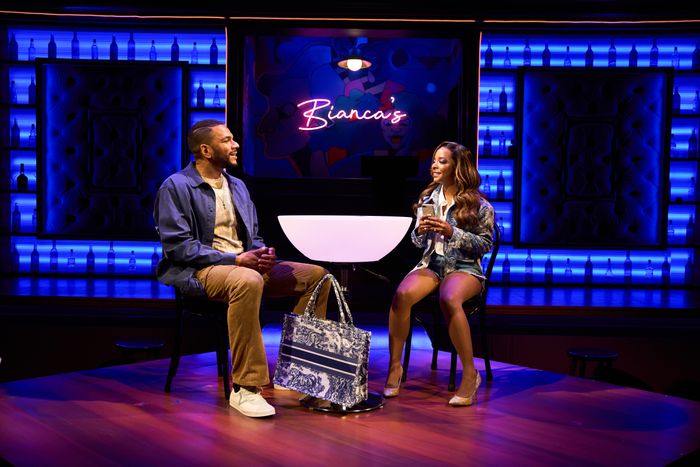
There’s a lot of fretting these days over whether theater audiences understand the assignment. Playbill has slipped a rather loftily worded audience-protocol page into its recent editions, presumably to try to keep hooligans from punching ushers and members of Congress from vaping and generally acting the fool. Meanwhile, a handful of Off Broadway productions have been taking the opposite tack. Notes encouraging audiences to laugh loudly and participate fully are popping up, laudably attempting to break through the carapace of formality and elitism that will cling to theater as long as we keep charging the prices we do. But whether we’re worried about literal violence and drunken idiocy or about snobbery and barriers to entry, one thing seems clear: We haven’t done a great job by our audiences, and something’s got to give.
That’s why it’s refreshing to see a show like Table 17, which not only includes a program note of encouragement from playwright Douglas Lyons but actually succeeds in creating the welcome physically and theatrically. “Laugh openly …” Lyons writes. “When the characters ask you for advice, don’t be shy, talk to ’em.” On the page, that’s cute — but affecting that dynamic in a space takes a sharp, willing director and actors bold and charming enough to help audiences get psyched, and then flexible enough to take the curveballs when they come. Good thing Lyons has Zhailon Levingston (of Cats: The Jellicle Ball) calling the shots and the rock-solid trio of Biko Eisen-Martin, Michael Rishawn, and the unnervingly excellent Kara Young playing the game. Young — who just took home her first Tony on her third nomination for Purlie Victorious — is so magnetic, so expressive and instinctively comedic, and then so present and moving, that most bodies three times her size don’t contain a fraction of her firepower. (She’s five-foot-two and doesn’t reach Eisen-Martin’s shoulder while wearing four-inch heels, and I would trust her to lift a car.) Meanwhile, Eisen-Martin has plenty of his own charisma, but he’s also able to receive and convert her high-wattage energy with the grace of a good straight man — figuratively and also not: “Ugh, the straights,” sighs one of Rishawn’s characters, a mean-gay maître-d’ named River, with the kind of eye roll that could only be the result of Malcolm Gladwell’s 10,000-hour rule.
The story Lyons has to tell belongs to Young and Eisen-Martin — playing Jada and Dallas, a pair of exes with unfinished business — but Rishawn gets to have the most fun. As the confirmed third wheel, the actor playing “everybody else,” not only does he devour the scenery as the very demure, very mindful River; he also gets to wear a bucket hat and practice his BDE while parodying the kind of bartender who lives to get laid “hard and often,” then snake his way between the leads as Eric, a smooth-talking alpha type who works with Jada as a fellow flight attendant and, eventually, offers her a shoulder to cry on, with a very swole arm underneath.
But all that’s in the past. We begin in the present, at the eponymous table. Scenic designer Jason Sherwood has turned MCC’s Robert W. Wilson black box into the kind of swanky restaurant where the walls are upholstered in magenta velvet and the cocktails cost $20 — but also, as River warns his customers, “Those chips be stale and that salsa is store-bought, you can do much better than that.” Here, Jada and Dallas are meeting — not on a date, that much is clear. Just to … catch up. It’s been two years since their painful breakup, a little more than that since their engagement, and six since they first met on a dance floor and clicked immediately. We’ll revisit all those scenarios as Lyons hops in and out of memory — which Levingston and costume designer Devario D. Simmons elegantly facilitate with clever little quick changes and varied uses of the playing space — but our home base is the restaurant, where Jada and Dallas’s table sits on a raised central platform, surrounded by identical tables for audience members. Having a certain percentage of the audience scenically immersed helps the participatory vibe, and the actors immediately make it clear that there aren’t going to be any walls here, fourth or otherwise. “Wait!” hollers Young’s Jada at the top of the show. “Am I overdressed?” She pauses, then demands, “I need y’all to be honest,” with such irresistible force that I heard several audience members blurt out something barely intelligible but clearly supportive. When the queen tells you to answer, you answer.
Throughout Table 17, Jada will appeal to the “ladies” in the house and Dallas to the “fellas,” and anyone who’s danced to “Hey Ya!” knows how that call-and-response goes. Though Lyons’s writing sometimes leans Hallmark, and though he occasionally rides a symbol a little too long and too earnestly (Eisen-Martin has to do a lot of semi-profound reflection on the metaphor of the “blind spot”), it’s the actors’ ability to foreground his cheekiness, wit, and energy that brings things back around. Lyons is in part writing a love letter to the Black rom-coms of the ’90s, movies like Love & Basketball, Poetic Justice, and How Stella Got Her Groove Back that created space for Black characters to be richly emotional, silly, and joyful and invited audiences to be a part of that celebration. Here — though the show inevitably touches on betrayal, heartbreak, and healing, too — the overall atmosphere is that of a round of wedding toasts. Helped along by the three expert performers, people are ready to cheer, happy to laugh, and uninhibited enough to holler back now and then. I won’t soon forget the middle-age man directly behind me who shouted, “That was embarrassing!” at top volume at a crucial moment when Eisen-Martin’s Dallas really put his foot in it. You’re not wrong, sir.
Yesterday, I sat on the grass outside the Old Stone House in Park Slope to watch a touring performance by Bread & Puppet Theater — and while that may seem like a far cry from Table 17, I thought back to Lyons’s play, and to Young, Eisen-Martin, and Rishawn’s comic chops, when I heard one of the circus performers proclaim our right to silliness. “Which!” she announced in a barker’s bellow, “is an underestimated ingredient of seriousness!” Amen. A rom-com might be “just” a rom-com, a delightful expense of 85 minutes, and that in itself is nothing to sneer at — and also, laughter enlarges and liberates, and there are myriad answers to the question of what we talk about when we talk about love.
Table 17 is at MCC Theater through September 29.




